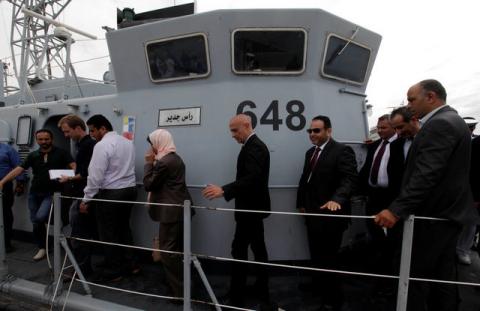Advertisement
Italy tries to bolster Libyan coast guard, despite humanitarian concern
TRIPOLI/AQUARIUS RESCUE SHIP (Reuters) - Italy gave the Libyan coast guard four repaired patrol boats on Monday to beef up Libya's efforts to stop people smuggling, but the support worries humanitarian groups operating rescue ships near the Libyan coast.
Italy and the European Union promised in February to spend millions of euros to help the Tripoli government upgrade its coast guard fleet, and some 90 crew have been trained by the EU.
"These are capable officials and sailors who from this point on can contribute to a double operation: the first is the control of Libyan waters, which is highly important for the stability of this country," Italian Interior Minister Marco Minniti said as he presented the U.N.-backed government in Tripoli with the vessels.
"The second is to contribute with other European countries and Italy to the security of the central Mediterranean, with a capacity to intervene against human traffickers and with preventative action against terrorism."
Another six repaired patrol boats will be delivered "in the coming weeks", Minniti said.
But Libyan officials say they need far more equipment than the vessels being delivered by Italy, none of which is new. Smugglers in Libya have packed hundreds of thousands of migrants attempting to reach Europe onto unsafe boats over the past four years, and thousands have died trying to make the crossing.
And humanitarian groups say that at sea, Libyan coast guards have put the rescue crews and migrants at risk in several incidents. The groups are concerned not only for their own safety but for that of migrants trapped in Libya.
Private aid vessels normally cruise in international waters about 20 miles off the coast of a country where militias and smuggling networks wield more power than the authorities.
Rescued migrants are brought to Italy because Libya is not considered a safe harbor. But increased capacity by the Libyan coast guard means more refugees and migrants will be returned to the lawless state.
Even centers nominally controlled by government authorities hold migrants captive in inhumane conditions. Elsewhere they are often extorted, abused, murdered and even bought and sold.
At sea, Libyan coast guards can become a threat to rescue crews and put migrants at risk, the humanitarian groups say.
The latest such incident occurred last week. A Libyan coast guard cutter sped across the bow of the Sea Watch 2 rescue ship, which had spotted a migrant boat and was on its way to assist. The Libyans instead picked up almost 500 migrants and returned them to Libya.
On board the Aquarius, a rescue ship now patrolling off the coast of Libya, the crew performs drills in case of an emergency lock down. If the coast guard or an unknown boat approaches without making radio contact, an alarm sounds. The crew scurries to a secure room, which is sealed shut after a roll call.
It is not only the armed coast guard that concerns the rescue boats, but also additional suffering for migrants. Those returned last week were sent to a detention center in Tripoli.
"These are human warehouses completely filled with people ... like sardines in a tin," said Annemarie Loof of Doctors without Borders, which operates the Aquarius rescue ship along with SOS Mediterranee. Loof visited Libyan detention centers last month.
"This is now celebrated as a success in Europe. The Libyan coast guard was trained and look, they're doing their job," she told Reuters aboard the Aquarius. "But these 500 people are still in Libya. They still want to escape Libya. They're just going to come back on a different boat, on a different day."
(Editing by Larry King)



















Add new comment